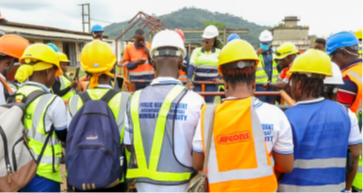Nimba University, formerly Nimba County Community College, has embarked on a transformative partnership with ArcelorMittal Liberia (AML) to bridge the gap between theoretical learning and practical application for its burgeoning Public Health program. This collaboration offers students invaluable hands-on experience at AML’s operational sites, enriching their understanding of public health principles and practices. The recent visit by Public Health students to AML’s state-of-the-art sewage treatment plant in Yekepa exemplifies the tangible benefits of this partnership. This immersive experience provided students with a real-world perspective on wastewater management, supplementing their classroom studies with practical observation and analysis.
The newly established Department of Public Health at Nimba University, currently home to approximately 40 students, recognizes the critical role of practical experience in shaping well-rounded public health professionals. The students, enrolled in Public Health 208, a course dedicated to water and sanitation, gained firsthand knowledge of wastewater treatment processes during their visit to the Yekepa facility. Witnessing the intricacies of a functional sewage treatment plant reinforced their understanding of the principles discussed in the classroom, fostering a deeper appreciation for the complexities of sanitation management.
J. Nelson Zenegbaian, Chairperson of the Department of Public Health, emphasized the significance of this collaboration, highlighting its role in strengthening the foundation of Nimba University’s College of Public Health. By providing students with practical exposure to real-world scenarios, the partnership enhances their preparedness for future careers in public health. The hands-on experience not only reinforces theoretical concepts but also cultivates critical thinking and problem-solving skills essential for navigating the challenges of the field.
The partnership’s potential extends beyond water and sanitation, encompassing other vital areas of public health, such as occupational health. This broader scope allows students to gain practical experience in diverse settings, further enriching their educational journey and broadening their career prospects. The collaborative framework established between Nimba University and AML fosters a dynamic learning environment, equipping students with the practical skills and knowledge needed to address complex public health issues.
The Yekepa site visit served as a practical learning experience, requiring students to document their observations and subsequently present their findings. This mandatory component contributes to their semester grade and reinforces the importance of critical analysis and effective communication. By presenting their observations, students develop crucial skills in data interpretation, synthesis, and presentation, essential for conveying complex information in a clear and concise manner. This exercise also boosts their confidence in applying theoretical concepts to real-world situations, fostering a sense of competence and preparing them for professional communication in their future careers.
During the visit, AML’s Environmental Engineer, Oliver Vaye, provided a comprehensive overview of the sewage treatment plant’s various components. He explained the plant’s gravitational flow system, which efficiently transports wastewater from the community to the treatment facility. This detailed explanation illuminated the engineering marvels behind wastewater management, highlighting the importance of infrastructure design in ensuring effective sanitation systems. The students also benefited from the expertise of Julia Dolo, Supervisor at the treatment plant, who guided them through each stage of the treatment process.
Dolo meticulously explained the journey of wastewater through the plant, starting with the influent compartment where solid waste is separated from the liquid component. She then described the subsequent stages of separation, ultimately leading to the discharge of clean water at the effluent point. This step-by-step explanation provided students with a clear understanding of the different treatment phases, emphasizing the importance of each stage in achieving the desired outcome of safe and environmentally responsible wastewater disposal. The field visit provided an invaluable opportunity for students to witness the practical application of classroom knowledge, deepening their understanding of water and sanitation processes. This immersive experience not only reinforced their theoretical understanding but also enhanced their career readiness in the field of public health. The partnership between Nimba University and AML exemplifies the power of collaboration between academia and industry in fostering practical learning and preparing future generations of public health professionals.














